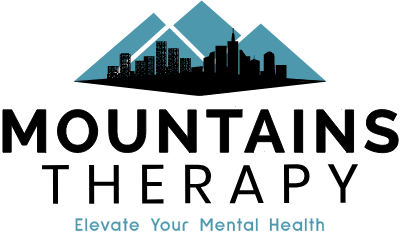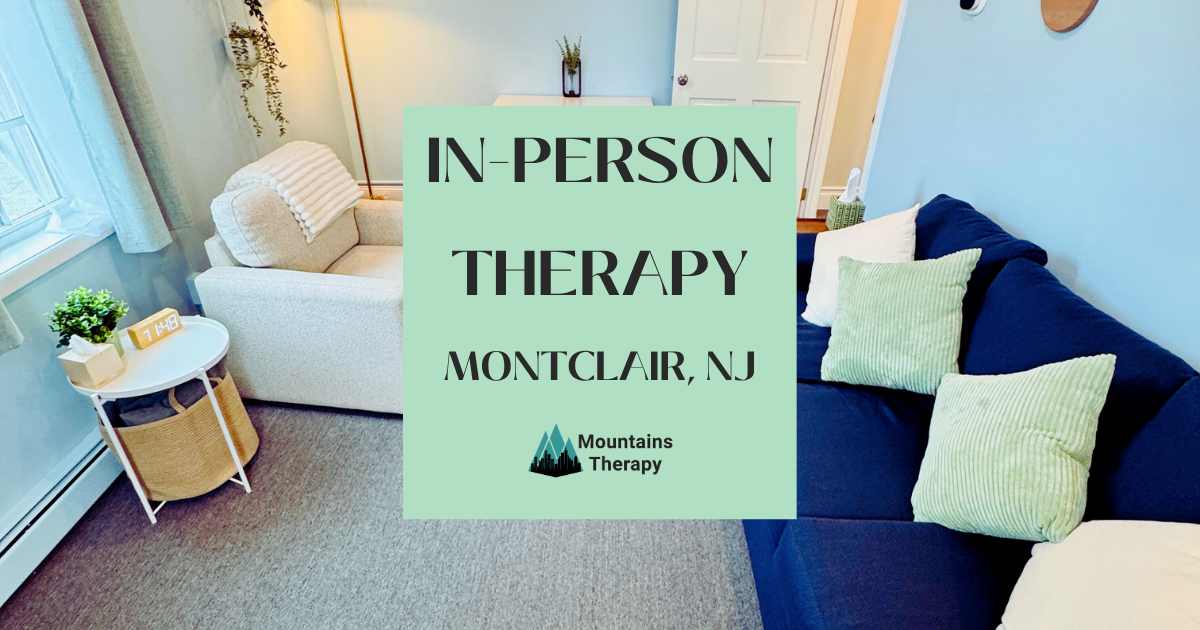Healing in Person: The Benefits of Face-to-Face Therapy in Montclair
Learn more about In-Person Therapy in Montclair, NJ.
In This Blog, You’ll Learn:
- What in-person therapy is and why it matters
- The benefits of face-to-face connection in healing
- The differences between in-person and online therapy
- What to expect from your first in-person session
- Answers to common questions about in-person therapy
- Services and evidence-based treatments offered at Mountains Therapy
Rediscover the Power of Human Connection
In a time when so many interactions happen behind screens, the opportunity to connect face-to-face has become deeply healing. At Mountains Therapy, we understand how valuable in-person therapy can be for those craving genuine connection, comfort, and safety. Meeting your therapist in person allows for subtle communication, eye contact, body language, tone, and shared space that helps you feel seen, understood, and supported. Whether you’re struggling with stress, anxiety, trauma, or relationship challenges, our Montclair therapy office offers a calm, private setting where your healing can unfold at your own pace.
A Holistic Approach to Healing
At Mountains Therapy, we approach emotional wellness from a holistic perspective. We consider the mind, body, and environment as interconnected parts of your healing process. Our licensed therapists work with individuals, couples, and families to uncover emotional blocks, rebuild confidence, and strengthen relationships. We tailor every session to your personal goals, recognizing that no two clients are alike. For adolescents and teens (ages 6 and up), we offer age-appropriate therapy to help build coping skills, manage emotions, and navigate social and academic pressures with confidence and resilience.
In-Person Therapy: A Safe and Grounding Experience
There’s something deeply reassuring about being in the same physical space as your therapist. Our in-person sessions are held in a warm, private office designed to help you feel calm, secure, and fully present.
When you attend therapy in person, you create a dedicated time and space for yourself—free from daily distractions, screens, and interruptions. This physical separation can help your mind and body relax, allowing deeper reflection and emotional release.
The Benefits of In-Person Therapy Include:
- Building stronger trust and rapport with your therapist
- Engaging in more open, connected conversations
- Gaining comfort from a consistent therapeutic space
- Experiencing nonverbal communication and grounding presence
- Having a structured environment that encourages focus and commitment
Services We Offer at Mountains Therapy
- Individual Therapy in Montclair, NJ
Personalized sessions to address emotional struggles, life transitions, self-esteem, stress, or trauma. - Couples Therapy in Montclair, NJ
Helps partners improve communication, resolve conflict, and reconnect with empathy and trust. - Marriage Counseling in Montclair, NJ
Focuses on repairing emotional wounds, building intimacy, and strengthening your relationship foundation. - Family Therapy in Montclair, NJ
Encourages understanding, reduces conflict, and restores balance to family dynamics.
Whether you meet in person or online, our therapists provide compassionate care with your unique needs at the center of every session.
Online Therapy: Flexible and Effective
If your schedule or location makes in-person sessions difficult. Online Therapy in NJ offers an equally effective way to access care. Our virtual sessions are secure, private, and flexible, allowing you to receive therapy from your home, office, or anywhere you feel most comfortable.
Benefits of Online Therapy Include:
- Convenient scheduling options
- Reduced travel time and costs
- Comfort of your own environment
- Consistent access to care in NJ, NC, FL, and UT
Both in-person and online therapy provide meaningful results—the right choice depends on your comfort level, needs, and lifestyle.
Our Therapeutic Techniques and How They Support Healing
- ACT – Acceptance Commitment Therapy in Montclair, NJ
Helps you accept difficult emotions and commit to behaviors that align with your values, fostering emotional resilience. - CBT – Cognitive Behavioral Therapy in Montclair, NJ
Identifies and transforms negative thinking patterns that cause emotional distress, empowering you to manage challenges effectively. - DBT – Dialectical Behavioral Therapy in Montclair, NJ
Builds emotional regulation and mindfulness skills to help manage intense emotions and maintain balance in relationships. - Gottman Method – Couples & Marriage Counseling in Montclair, NJ
A research-based approach for couples to improve communication, rebuild trust, and foster deeper emotional connection. - Mindfulness-Based Therapy in Montclair, NJ
Encourages awareness of the present moment, reducing anxiety, stress, and rumination while increasing calm and clarity. - Psychodynamic Therapy in Montclair, NJ
Explores early experiences and unconscious emotions that influence your current behavior and relationships.
- Narrative Therapy in Montclair, NJ
Helps you reframe your personal story, separating your identity from your challenges and empowering lasting change. - SFT – Solution Focused Therapy in Montclair, NJ
Focuses on your strengths and short-term goals, helping you create actionable steps toward improvement and growth. - TF-CBT – Trauma Focused Cognitive Behavioral Therapy in Montclair, NJ
Combines trauma processing and coping tools to help individuals heal from painful experiences with safety and structure.
FAQs About In-Person Therapy
- What is the meaning of in-person therapy?
It refers to meeting face-to-face with your therapist in a private office to talk openly, build trust, and process emotions in real time. - What is in-person therapy?
In-person therapy is traditional counseling where clients and therapists meet physically, allowing for deeper emotional engagement. - What are the three types of therapy?
CBT, Psychodynamic Therapy, and Humanistic Therapy are the most common therapeutic approaches. - How long does in-person therapy usually last?
Sessions typically last 45–60 minutes. Long-term therapy can last months or years depending on your goals. - How to tell if in-person therapy is working?
You may notice reduced stress, better emotional regulation, healthier communication, and a greater sense of self-awareness. - Is in-person therapy covered by insurance?
Mountains Therapy is out-of-network, but we provide superbills for clients to submit to their insurance for possible reimbursement. - How can I prepare for in-person therapy?
Reflect on your goals, write down concerns or topics, and arrive ready to share openly in a safe environment. - Can a therapist date a client after 2 years?
No. Ethical codes prohibit therapists from romantic relationships with former clients for at least two years or more depending on state laws. - What is the 2-year rule for therapists?
It protects clients by requiring a two-year waiting period before any potential personal relationship with a former client. - What is the most common ethical violation in counseling?
Boundary violations and confidentiality breaches are among the most reported ethical issues. - How long is too long to have the same therapist?
There’s no fixed rule. As long as therapy supports growth and healing, ongoing work with the same therapist can be beneficial. - Is it normal to be in therapy for 2 years?
Yes, many people continue therapy for several years to support personal development and maintain emotional wellness. - What is the 3-month rule in mental health?
This guideline suggests that clients may notice emotional progress after about three months of consistent sessions. - What is section 63 of the Mental Health Act?
This section (specific to the UK) outlines treatment procedures for individuals with mental illness in hospital settings. - What is the reason for the 72-hour hold?
It allows mental health professionals to hold someone in crisis for evaluation and safety if they pose a risk to themselves or others. - How long can you voluntarily stay in a mental hospital?
Voluntary stays can vary from a few days to several weeks depending on the individual’s recovery plan and stability. - What is the 3-3-3 rule in mental health?
This grounding technique involves identifying 3 things you see, 3 things you hear, and 3 things you can touch to reduce anxiety. - What is the hardest mental illness to live with?
Severe depression, BPD, or chronic anxiety can be especially challenging, but therapy can make meaningful improvement possible. - Is therapy more effective in-person or online?
Both are effective, but many clients feel that in-person sessions provide stronger emotional connection and accountability. - What is the most effective way of therapy?
The best therapy depends on your needs. Many benefit from a blend of CBT, mindfulness, and relational approaches. - What is a red flag for a therapist?
Unclear boundaries, lack of empathy, or failure to maintain confidentiality are serious warning signs.
Start Your Journey Toward Healing
Whether you prefer in-person or online counseling, Mountains Therapy is here to support your emotional wellness.
Our Montclair office offers a calm and compassionate environment where you can explore your thoughts, understand your emotions, and find balance. Take the first step toward meaningful change today.














